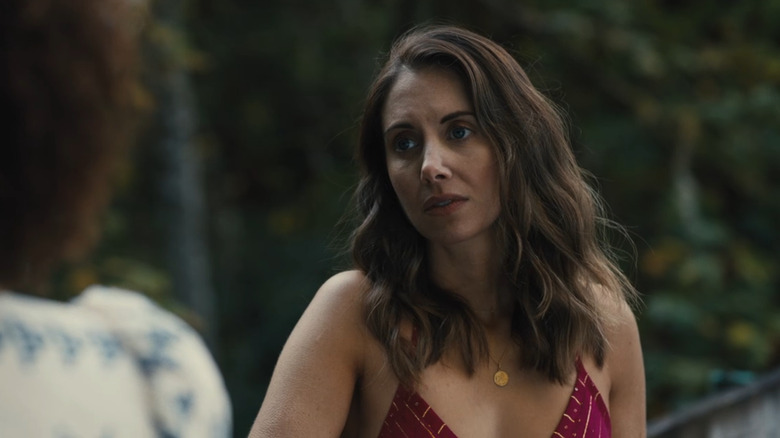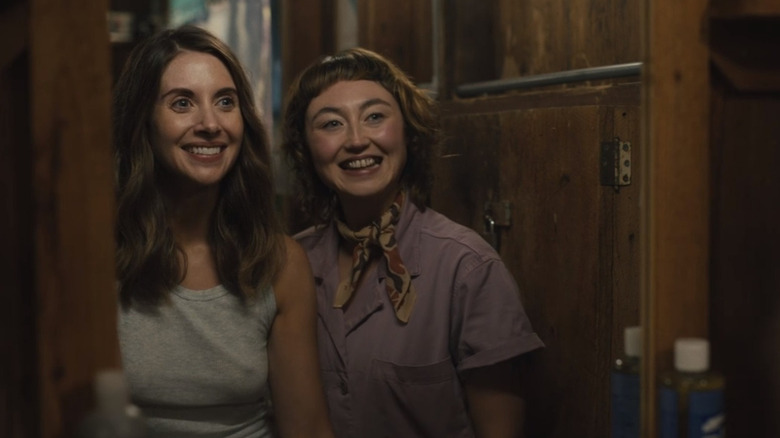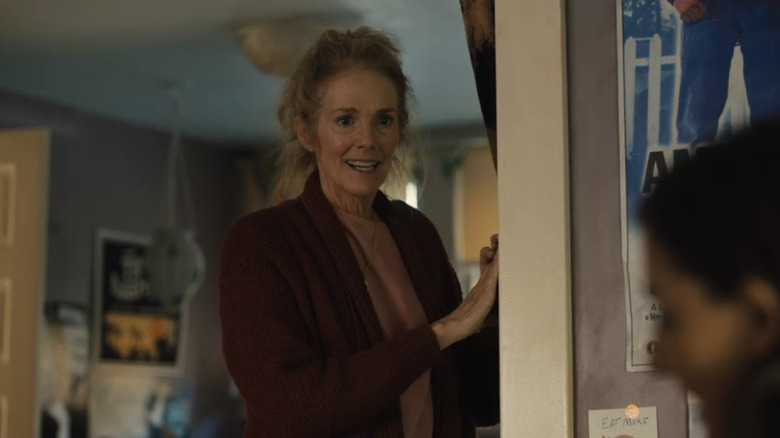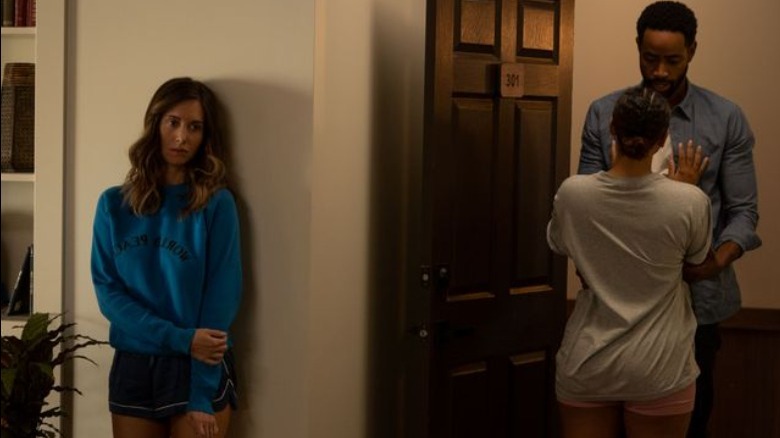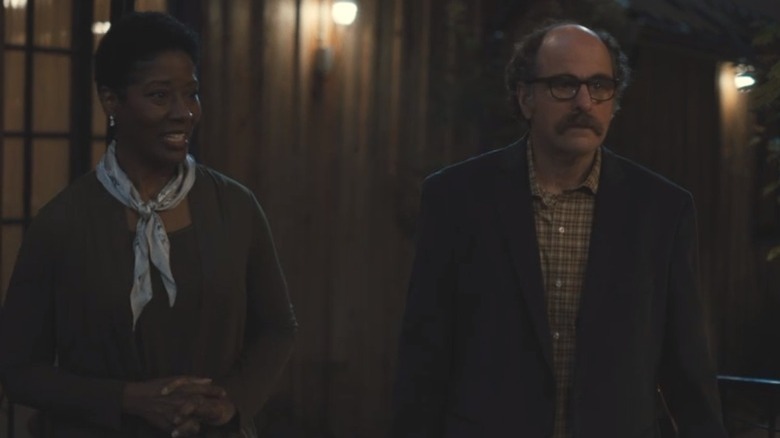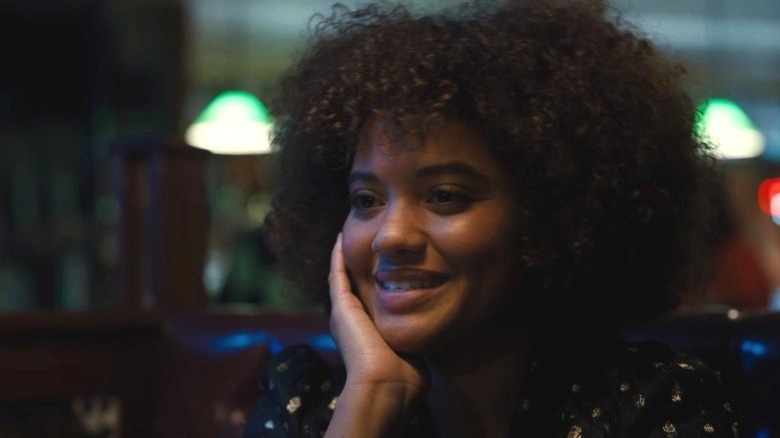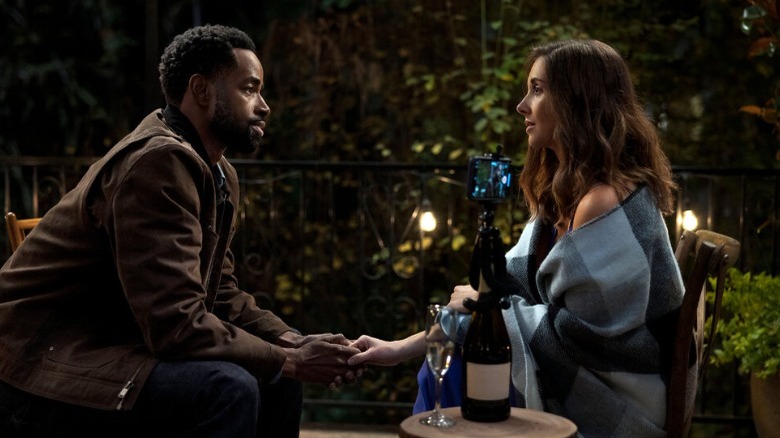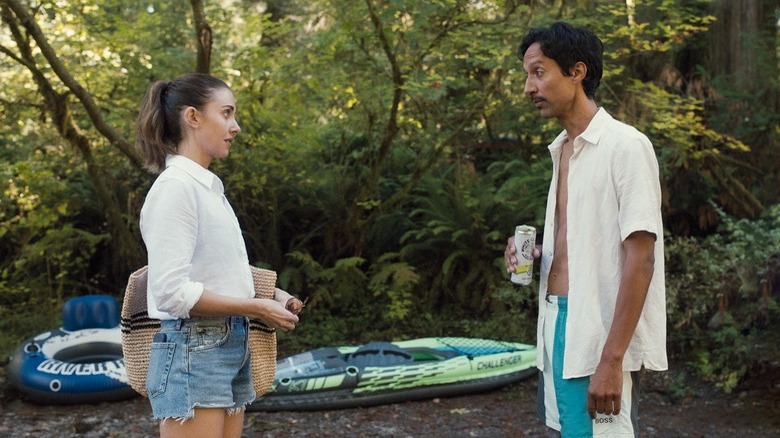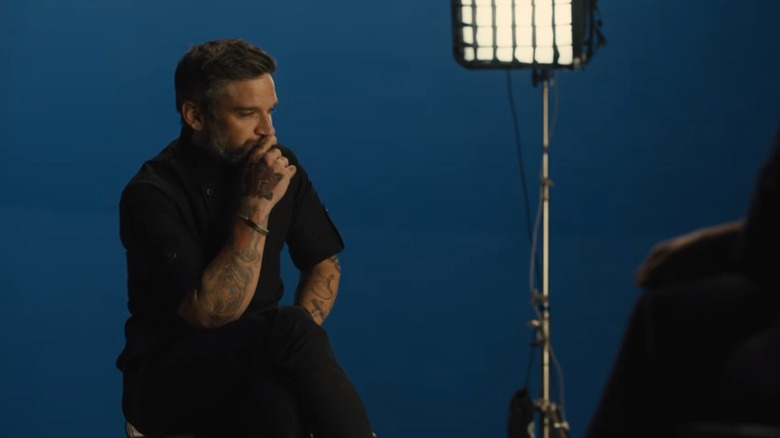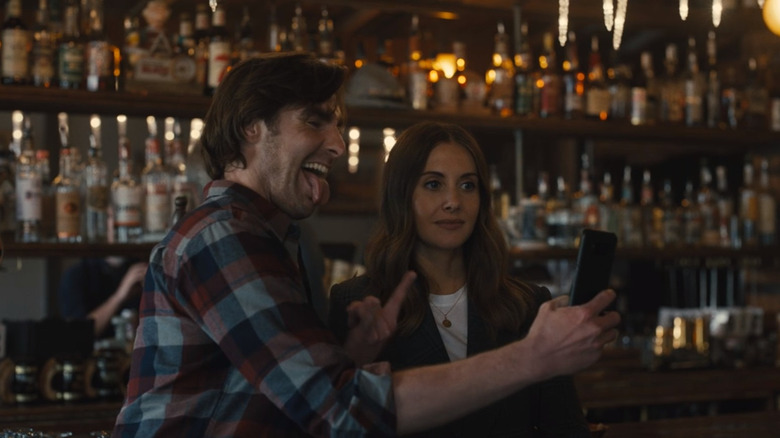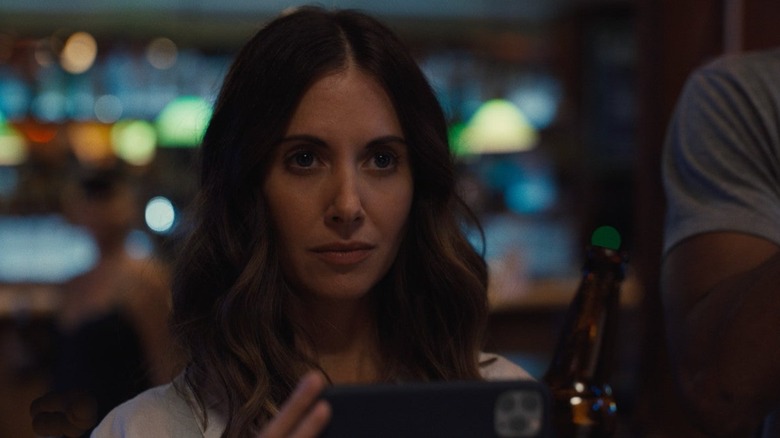The Ending Of Somebody I Used To Know Explained
What is it that we mourn when things change, when we look back on the paths we didn't take? Do we really regret not taking certain jobs, or letting "the one that got away" get away, or do we really miss some innate part of ourselves that time and the weariness of age have made hard to reach? "Somebody I Used to Know," an elegantly entertaining and heartfelt new romantic comedy, manages to ponder these deep questions while also more than fulfilling both the "romantic" and "comedy" portions of the genre. Despite a relatively quiet release on Amazon Prime, the movie's been well-received by critics.
Alison Brie stars as Ally, a TV producer on a familiar rom-com journey: Visiting her hometown leads her to reconnect with an ex, Sean (Jay Ellis). But everything else about "Somebody I Used to Know" plays off our expectations as information is revealed, dynamics shift, and long-simmering feelings come to the fore. Brie gives a dynamic performance that allows her to harness her comedic timing and dramatic vulnerability. (She gets to shine again alongside Danny Pudi, in a mini-"Community" reunion, like an aperitif before the full-length "Community" reunion film comes to Peacock.) It probably helps that Brie co-wrote the screenplay with her husband, Dave Franco, who also directed the film. While there's certainly a lot going on in the performances and dialogue, let's unpack the film's story, too. This is the end of "Somebody I Used to Know" explained.
Ally gets back to herself by losing her clothes
The epilogue of "Somebody I Used to Know," set six months after Ally has successfully avoided ruining the wedding of Sean and his bride, Cassidy (Kiersey Clemons), does give us a hint she's got love in her future. Her cameraman, Christian (Kelvin Yu), who earlier awkwardly rejected her offer to hang out, asks what she's up to after their latest day of filming wraps. But while it throws the idea of future romance a conventional bone, the real resolution is that Ally has refocused her priorities in her professional career: It's this confidence that Christian is responding to in the first place.
Over the course of "Somebody I Used to Know," it becomes clear that the "somebody" of the title isn't her ex, but Ally herself. Six months after making her peace with the past, she's reconnected with the documentary roots that motivated her to leave for Hollywood in the first place, and combined with her young passion for nudism to make a new series exploring the nudist lifestyle. In a parallel to the movie's opening scene, where Ally was hyping herself up to use her unnerving eye contact to get a "Dessert Island" contestant to open up, she has a brainstorm and decides to get naked herself, along with her entire crew, to make her latest subject feel more at ease instead of awkward and on the spot.
Ally's romantic future was never really in doubt: She's a successful TV producer with the stunning looks of Alison Brie, after all. But "Somebody I Used to Know" leaves us with the message that confidence in oneself is what really ensures lasting romantic connections: Ally's date is even postponed by a week so she can visit her mother and stay in touch with her roots instead of letting several years pass again.
A mother's everlasting patience
The quiet MVP of "Somebody I Used to Know" is veteran actress Julie Hagerty, whom you may recognize from movies like "Airplane!" and "What About Bob?" As Ally's mother, Libby, Hagerty delivers some delightfully ribald dialogue related to Ally walking in on her having sex multiple times, but she also patiently waits for her daughter, who hasn't been home in years, to actually spend time with her. Her pleasant but quietly sad tone, leaving messages and notes for her adult child who seems to have little time for her, will be relatable to parents everywhere who have navigated the roller coaster of a long-empty nest.
When you're on the kind of existential bender that Ally is, the last people you want to speak to are your parents, the people who often know you the best. But after her plan to disrupt Sean's wedding finally blows up in her face, Ally comes crying to her mother and gets a powerful reminder of what it means to be known and loved. Libby points out that Ally has always followed her heart and that her motivations come from a pure place and basically explains who she is and helps her daughter finally move forward. In a small part, Hagerty leaves a vivid impression of what it's like to navigate the loneliness of your child growing up (along with the freedom to maintain an active sex life).
Sean and Cassidy's happily ever after
To keep the tension high, "Somebody I Used to Know" plays a long game in slowly revealing the context of Sean and Cassidy's relationship. At first, they seem like a surprisingly toxic couple in a movie with such a kind vibe. Cassidy is giving up touring with her band and moving in with Sean in his small-town life, essentially replicating the choice that Ally faced and decided against. And now that Ally's show is canceled and she's regretting that choice, it seems very plausible that she could insert herself between them. It does, though, seem a little implausible that she would really be welcomed as their wedding videographer.
But when we learn that these plans were made when they thought Cassidy was pregnant, it all makes sense. With a child on the way, they decided to focus on raising a family. But either the pregnancy was lost or it was a false alarm, and now the couple has been going through the motions without addressing the fallout. For the most part, Ally's incessant meddling with their relationship turns out to be a blessing in disguise, as it forces them to admit what they really want to one another. Cassidy decides to keep touring, Sean is fine with it, and they seem happy as clams in their wedding video — footage of which is thankfully forwarded to Ally, who has finally realized she's not meant to be there.
Cassidy's parents
The most ostensibly romantic scene in "Somebody I Used to Know," when it seems like Ally's plan is just about to work, is interrupted by the arrival of Cassidy's parents Teresa (Rachel Pate) and Mike (Jeb Berrier), who are there on Ally's secret invitation. In her most egregious act, which the movie tries to soften a little by having Ally's assistant not hear her tell her not to go through with it, Ally sends them the itinerary against Cassidy's express wishes: She explains very clearly that she doesn't get along with her parents for many reasons, one of which is their disapproval of her fluid sexuality.
Their arrival goes over disastrously with Cassidy, who initially blames Sean for inviting them and calls off the wedding. As a counterpoint to Ally's ever-patient mother, Cassidy's parents are a reminder that not everyone has the lifelong safety net of a comforting family. Although Ally eventually confesses that she was responsible to Cassidy, she never manages to tell Sean that she let him take the blame. The lack of blowback for this shameless violation of Cassidy's consent is probably the most significant dangling thread in "Somebody I Used to Know." Ally learns a lot about herself, but she gets off a little easy for some reprehensible behavior.
My Best Friend's Wedding-type nonsense
In a display of welcome self-awareness from both the movie and the characters, "Somebody I Used to Know" has Cassidy put Ally on the spot directly and ask if she's going to pull some Julia Roberts-esque behavior out of the classic rom-com staple "My Best Friend's Wedding." Ally denies having ulterior motives, but her plan is in fact broadly similar to the plot of the movie, in which a woman attempts to sabotage the wedding of her childhood friend to a younger woman.
In fact, "Somebody I Used to Know" drops this reference verbally after a scene that directly parallels a specific moment in the 1997 classic. In "My Best Friend's Wedding," Roberts' character attempts to embarrass her rival, played by Cameron Diaz, by making her sing karaoke when she's clearly reluctant to do so. In an inversion of that dynamic, Cassidy has just tried to embarrass Ally by cajoling her into freestyling in front of the entire wedding party. But Ally turns out to be as skilled on the spot (as Alison Brie herself is known to be from "Community" blooper reels) and wows the crowd with an impromptu parody of Third Eye Blind's "Semi-Charmed Life."
Ally and Sean's second failed romance
"Somebody I Used to Know" dangles the prospect of Sean and Ally actually getting back together, utilizing the chemistry between leads Jay Ellis and Alison Brie and some well-crafted plotting to let them see that it wouldn't actually work without having to commit to it. After their first night back in one another's company becomes a hazy, fun-filled montage that lasts until the next morning, Ally reads Sean's deceit in not mentioning his imminent wedding as an (accurate) sign that he's having second thoughts. And after her deceit about inviting Cassidy's parents actually breaks up Sean and Cassidy, it seems like the former lovers might actually reunite.
But of course, this is just when "Dessert Island" gets an improbable fourth season pickup from a streaming network, causing Ally to remember that she has an entire life in Hollywood that she's built for herself. Though she has reservations about reality TV, she remembers why she chose to leave Sean and her hometown in the first place. She gets defensive when Sean dismisses her life's work to that point, though she was the one who expressed regret at having made the "wrong choice" just days earlier. Unlike countless other romances that deal in terms of fate and destiny and posit love as some sort of eternal or even supernatural force, "Somebody I Used to Know" uses subtle and clever twists to show us that love is a mixture of chemistry, timing, and being at peace with your own choices and your perception of yourself.
Benny the confidante
Putting their long-running chemistry as "Community" co-stars and real-life friends to good use, "Somebody I Used to Know" has Danny Pudi's character, Benny, caught in the middle of the drama as a long-term mutual friend of both Ally and Sean. And unlike the "funny confidante" role in many romantic comedies, he's not exclusively on either Ally or Cassidy's "side" in terms of rooting interest. He understands where Ally is coming from and can't argue with her logic in suspecting Sean might be having doubts, but he also keeps Sean and Cassidy's confidence and doesn't reveal important information to Ally that would help her, like the fact that they're only engaged because of a pregnancy scare.
Where a lesser movie would have Ally and Benny end up together, "Somebody I Used to Know" keeps them in the platonic, almost sibling-like area that long-term friends often settle into. As we age, especially as we get distant from our hormone-driven and drunken college years, we're more than capable of maintaining all sorts of close friendships without romance coming up. Other than vaguely mentioning that something with "Talia" didn't work out, Benny only serves as a sounding board for Ally. The closest they get physically is when she (along with several other characters) punches him in the nuts in a hilarious running gag.
It's real people you're hurting
One of the more interesting themes in "Somebody I Used to Know" is how the film deals with reality TV. As the movie opens, Ally is seen using her penchant for intense silence to get a contestant on her reality competition show to break down emotionally. In a perfectly timed reveal, we learn that Chef Jamie (Evan Jonigkeit) has gotten divorced as a result of whatever sacrifices he had to make to become the two-time reigning champion of "Dessert Island." He even echoes a classic reality TV sentiment in the film's most arch and ironic moment: "I wasn't here to make friends. I was here to make flans." When Ally meets an old classmate after her arrival in town, she casually refers to her show as "something mindless we can put on in the background."
Although it's only lightly implied by Ally's behavior at the wedding, the movie draws a pretty straight line between her motives and actions as a reality TV producer and the way she sets about manipulating Sean, Cassidy, and everyone else at the wedding to get what she wants. Cassidy, though, proves immune to her silence trick and actually becomes her friend. And for his part, Sean lets Ally have it when he realizes she's been toying with his life, telling her that whether it's here or in Hollywood, she's built a career out of being able to manipulate people. He points out that no matter what the context is, it's "real people" she's hurting.
The perils of Instagram
In a small but clever reveal, the inciting incident of "Somebody I Used to Know," when Sean and Ally run into one another in the first place, turns out to have been more than a coincidence. As Benny later reveals, Sean went to the bar on purpose after he saw an Instagram photo taken by Matt Nolan (T'ai Hartley). Matt's an annoying classmate who recognizes Ally when she walked into the bar. It's important to reveal Sean's motivations as the movie moves along because it helps to balance Ally's increasingly manipulative behavior with his own. He rushed to see her the moment he saw she was home, and he purposefully didn't bring up his engagement for the entire night they spent hanging out.
"Somebody I Used to Know" uses Instagram as a running element to show just thoroughly, as "The Social Network" chillingly foretold more than a decade ago, we now "live on the internet." Ally uses the app to gather information on Cassidy, and "likes" a photo of her performing with her band to subtly reinforce her insecurity about quitting music.
Like it or not, we have to live with our social media
For all its depictions of the pitfalls of social media and the toxicity of our relationship to (and reliance on) it, "Somebody I Used to Know" also shows how there are positive aspects of our attachment to social networks. On a more positive note at the end, Ally likes a photo of Cassidy's baby bump after she and Sean are happily married. Unlike the flash drive that she has to dig up to remind herself of happy times with Sean a decade before, the world as we know it now brings us images that invoke emotional reactions without any effort and without any warning.
"Somebody I Used to Know" may start with the well-worn premise of visiting your hometown, but it uses social media to remind us that we live in an era of ubiquitous and constant nostalgia. We're inundated, on the anniversary of every photo and associated memory, with the past, and reminded in the present passively a plurality of all of the people we've ever known well. And it takes a constant effort of will, a constant measure of acceptance of who we are now and the shape of our lives in the present, not to resent the paths untaken, and the happiness of the people whom we had to let go.
